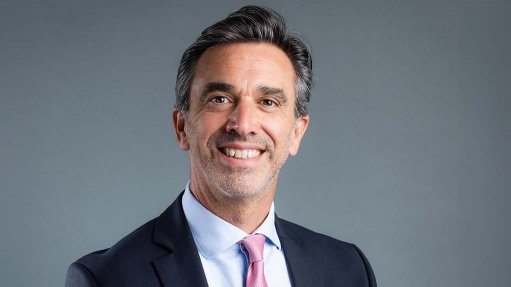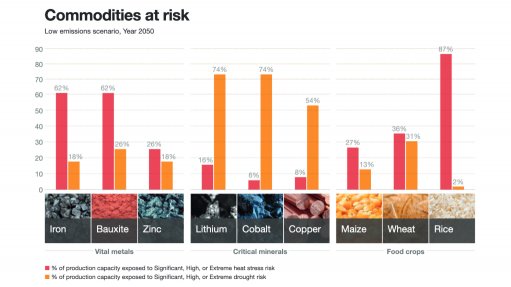Absa announces net-zero emissions targets for 2050
Financial services firm Absa has announced that its long-term ambition is to reach net-zero by 2050 for Scope 1, 2 and 3 greenhouse-gas emissions.
It has also committed to setting near- and long-term Scope 1 and 2 emissions reduction targets and having these targets validated by private sector climate action organisation the Science-Based Targets initiative.
Absa recognised its contribution to a sustainable future and the extent to which its business needed to reflect that in the operating choices that it made. As such, it had a group-wide target to reduce operational emissions by 51% from 2018 levels by 2030 and was on track to reach this target, it said.
It had achieved an overall reduction of 21.3% to date, it added, although it did not provide a context for this figure.
“Our net-zero declaration underpins our belief in and support for a just transition. The transition to a resilient and sustainable economy must be inclusive and equitable for communities, investors and industries, and leave no one behind,” said Absa chief strategy and sustainability officer Punki Modise.
Additionally, Absa aims to move away from a reactive and compliance-based approach to sustainable financing, reporting and disclosures, and instead consolidate a strategy-driven approach to unlocking the social impact, climate resilience and enterprise shared-value opportunities presented by its sustainability and net-zero commitments.
Absa said it planned to maintain its sustainability reporting and disclosures, in addition to the prescribed King IV Integrated Report, while ensuring that it incorporated the latest standards and best practices, as the need for greater transparency grew.
Currently, Absa makes its 'Environmental, Social and Governance', 'Task Force on Climate-Related Financial Disclosures' and 'Principles for Responsible Banking' reports available to the public.
Further, Absa said it was committed to mobilising the resources necessary for supporting its clients’ energy transition, thereby reducing their carbon emissions and, ultimately, those of the countries in which it operated.
“Our commitment to entrench environmental, social and governance (ESG) principles throughout our business underpins this support, as we believe that ESG is vital for delivering real long-term value and our purpose of empowering Africa’s tomorrow together,” Modise said.
Supporting a transition to a low-carbon economy was underpinned by Absa's aspirations to be an active force for good in everything it did, prioritising business activities that had the most positive environmental, social and economic impact, while mitigating negative impacts, she added.
“While we recognise Africa’s particular vulnerability to climate change, our approach to net-zero also takes cognisance of the development needs of Africa’s people,” she highlighted.
SECTORAL TARGETS
In terms of coal financing, Absa supports diversifying the electricity and energy supply, and a balanced energy mix, as well as supporting clients through the energy transition.
“Funding of the coal sector will be in line with Absa's Coal Financing Standard, which provides a framework for addressing Absa Group’s sustainability risks and disclosures. Coal credit exposure as a percentage of loans and advances to customers, including off-balance sheet items, was 0.04% in 2022.
“We expect to reduce the coal credit exposure limits from 0.2% in 2023, to 0.11% in 2030, with further reductions to 0.06% in 2040 and 0.03% in 2050,” Modise said.
Further, in the oil and gas sector, Absa's credit exposure limits to the oil sector are expected to peak at 1.41% of group loans and advances to customers, including off-balance sheet items, in 2023, up from 1.03% in 2022. Thereafter, it targets a significant reduction to 0.46% in 2030, 0.22% in 2040 and 0.04% in 2050.
“However, as we consider gas a transition fuel, the trajectory of our lending targets differs from oil and coal, and our gas sector group loans and advances to customers, including off-balance sheet items, are expected to exceed oil by 2027.
“We expect our total credit exposure limits to the gas sector to increase to 0.60% in 2023, up from 0.51% in 2022, and to peak at 0.83% in 2030. Thereafter, we target a material reduction to 0.52% in 2040 and 0.32% by 2050.”
Meanwhile, in the wind and solar energy sector, Absa plans to mobilise a cumulative R100-billion of sustainable finance by the end of 2025, while its Relationship Banking unit in South Africa aims to finance R2.5-billion of embedded renewable power by 2025.
Absa also expects to grow its renewable energy lending at a compound annual growth rate of 26% by 2025, thereby doubling the lending commitment over the period.
In addition, Absa, through its Vehicle and Asset Finance division, commits to support the adoption of new energy vehicles, while taking into account the charging and other infrastructure needs for both in-home and on-the-road usage, Modise noted.
EMBEDDED ESG
“In the past year, we have made significant progress in the area of sustainability, which is an integral part of our commitment to being an active force for good in everything we do. This has also seen us accelerating the embedment of environment, social and governance across our business,” said Absa CEO Arrie Rautenbach.
Further, owing to the severe loadshedding situation in South Africa, Absa has taken the initiative to assist its clients during this time.
“We are working closely with them to discover inventive approaches that can reduce energy usage, improve productivity, and support the reduction of greenhouse gas emissions. Our objective is to aid our clients in reducing the impact of loadshedding on their day-to-day activities and operations while simultaneously aiding the worldwide mission of mitigating climate change,” he said.
Meanwhile, Absa was pleased with the latest tax incentives announced by Finance Minister Enoch Godongwana, which promoted the adoption of renewable energy sources by both households and businesses. This had the potential to increase renewable energy production and alleviate the energy crisis, Rautenbach added.
“We support a just transition that addresses Africa’s energy poverty, and we have prioritised the promotion of sustainable and inclusive economic growth, employment and decent work for all.
“Several of the countries in which we operate rely on oil and gas sectors for their socioeconomic development. Our objective, therefore, is to aid customers and communities in achieving sustainable and inclusive growth, and leaving no one behind, by providing services that facilitate the transition and adaptation process, promoting an ethical and inclusive supply chain, and ensuring that stakeholders have a say in our climate change decisions.
“Embarking on a journey to achieve a net-zero state by 2050 is an important step towards supporting a just transition and a sustainable future,” he added.
Comments
Announcements
What's On
Subscribe to improve your user experience...
Option 1 (equivalent of R125 a month):
Receive a weekly copy of Creamer Media's Engineering News & Mining Weekly magazine
(print copy for those in South Africa and e-magazine for those outside of South Africa)
Receive daily email newsletters
Access to full search results
Access archive of magazine back copies
Access to Projects in Progress
Access to ONE Research Report of your choice in PDF format
Option 2 (equivalent of R375 a month):
All benefits from Option 1
PLUS
Access to Creamer Media's Research Channel Africa for ALL Research Reports, in PDF format, on various industrial and mining sectors
including Electricity; Water; Energy Transition; Hydrogen; Roads, Rail and Ports; Coal; Gold; Platinum; Battery Metals; etc.
Already a subscriber?
Forgotten your password?
Receive weekly copy of Creamer Media's Engineering News & Mining Weekly magazine (print copy for those in South Africa and e-magazine for those outside of South Africa)
➕
Recieve daily email newsletters
➕
Access to full search results
➕
Access archive of magazine back copies
➕
Access to Projects in Progress
➕
Access to ONE Research Report of your choice in PDF format
RESEARCH CHANNEL AFRICA
R4500 (equivalent of R375 a month)
SUBSCRIBEAll benefits from Option 1
➕
Access to Creamer Media's Research Channel Africa for ALL Research Reports on various industrial and mining sectors, in PDF format, including on:
Electricity
➕
Water
➕
Energy Transition
➕
Hydrogen
➕
Roads, Rail and Ports
➕
Coal
➕
Gold
➕
Platinum
➕
Battery Metals
➕
etc.
Receive all benefits from Option 1 or Option 2 delivered to numerous people at your company
➕
Multiple User names and Passwords for simultaneous log-ins
➕
Intranet integration access to all in your organisation


















